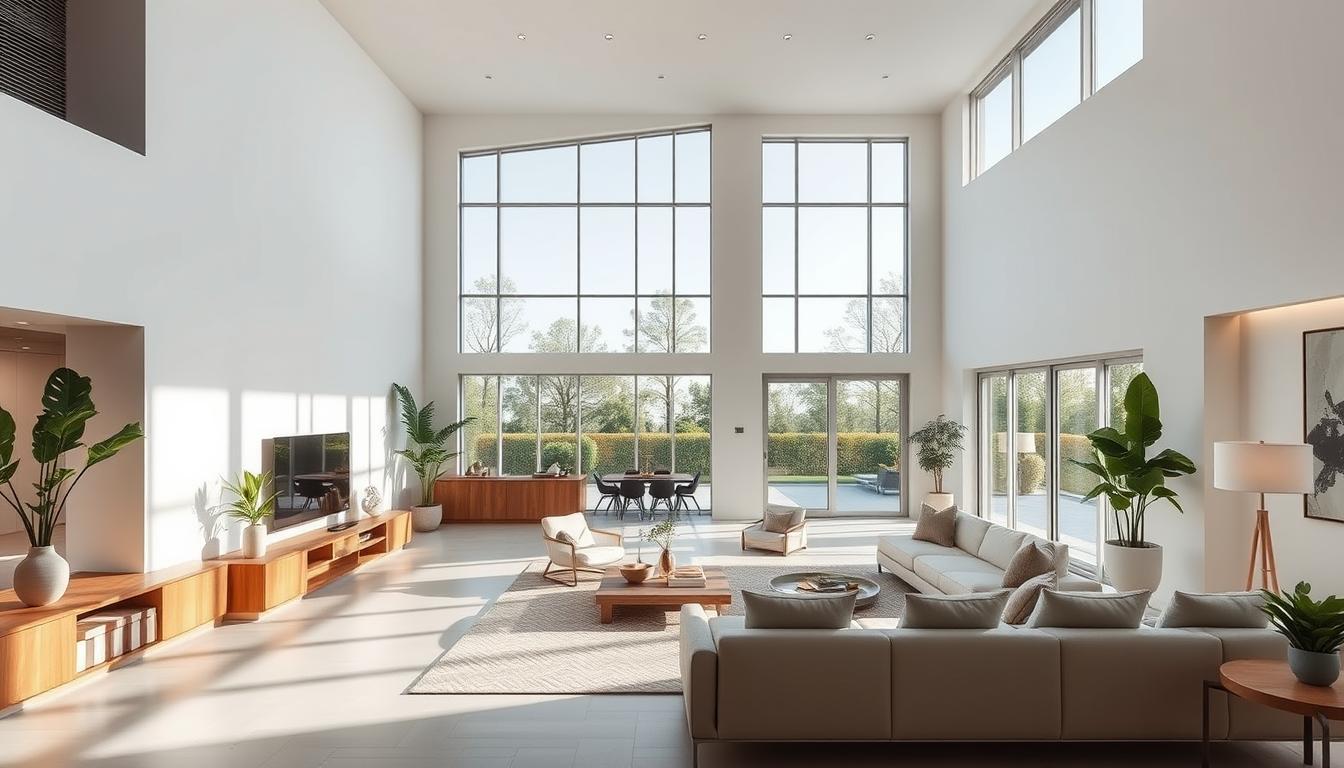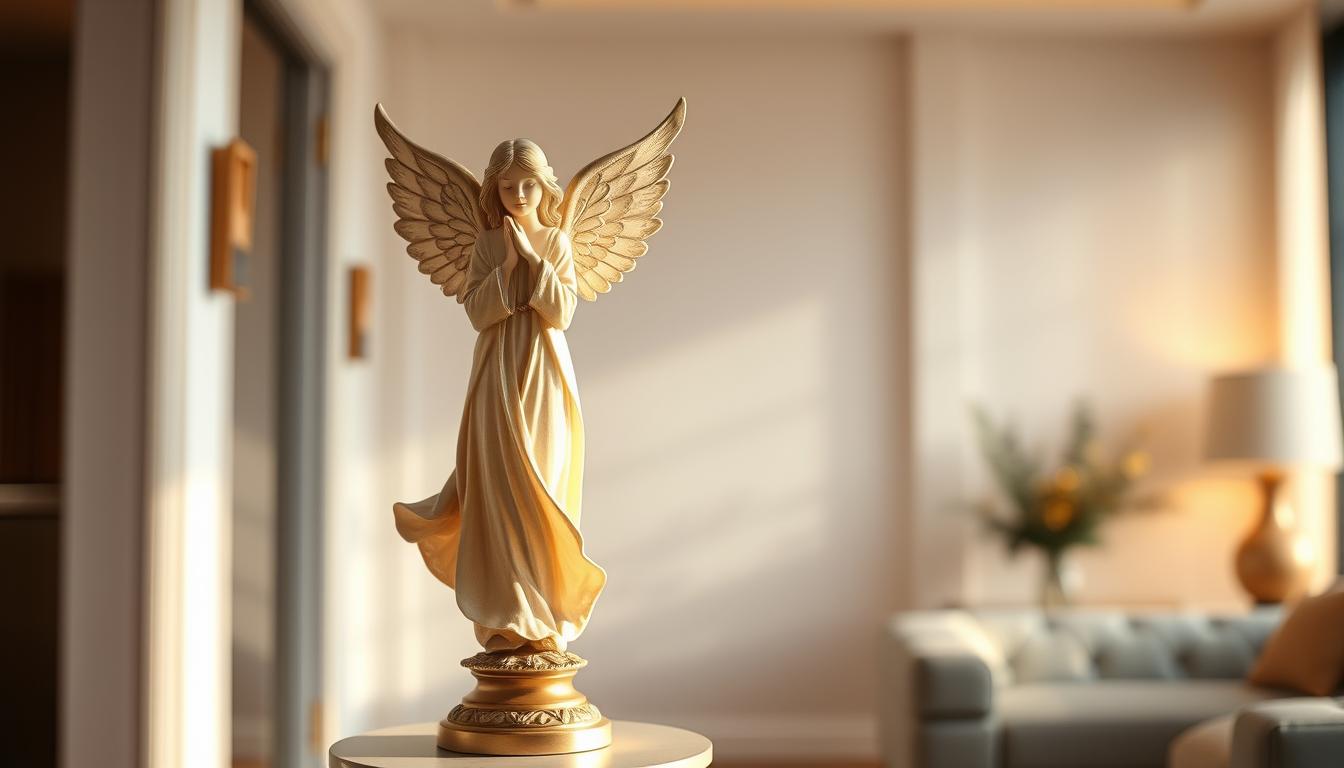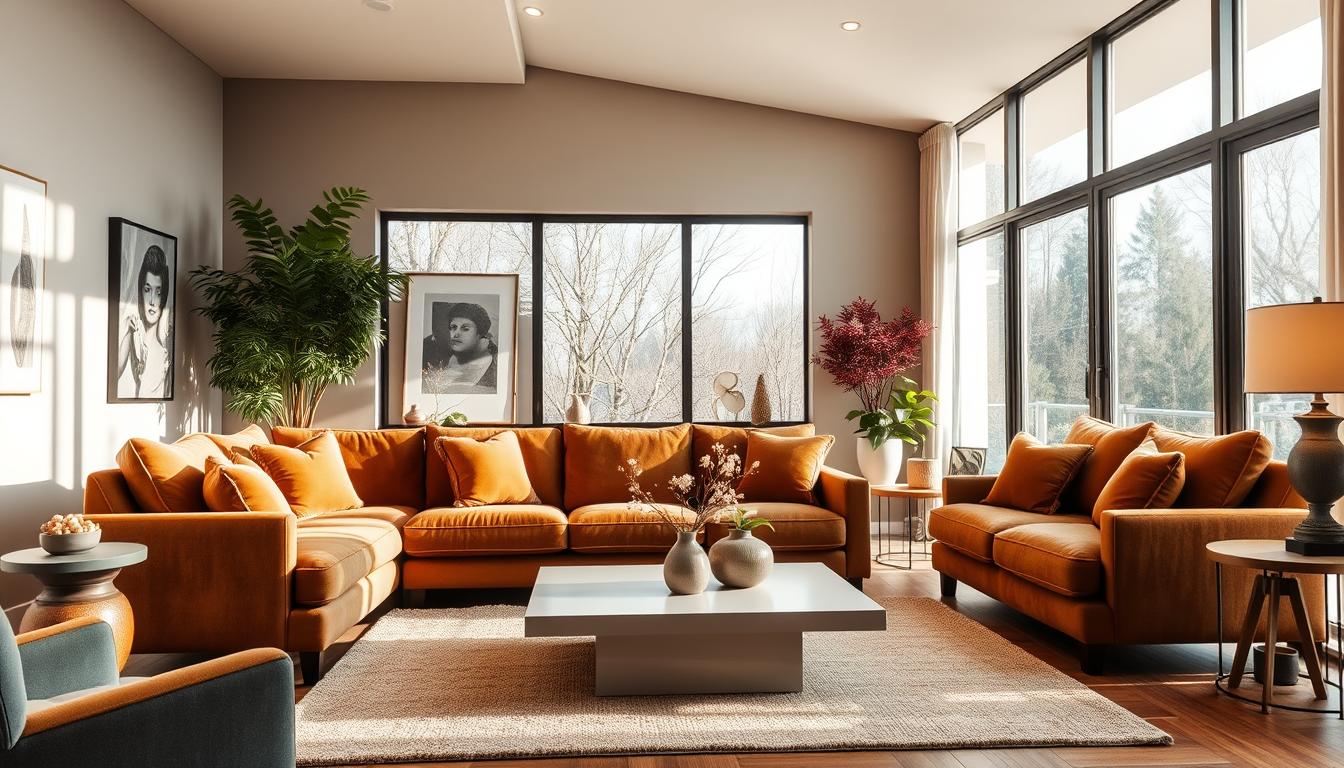Did you know a well-designed living space can make you happier and more productive? Creating a stylish and functional living area is more than looks. It’s about making a space that shows who you are and meets your needs.
We know how important a beautiful and useful space is. That’s why we’ve picked our top 10 home interior design ideas for you. From modern design inspiration to stylish renovation ideas, we’ll show you the latest trends and tips. We’ll help you create a cozy and stylish space.
Key Takeaways
- Discover the latest trends in stylish interior design
- Learn how to create a functional and comfortable living space
- Explore modern design inspiration for your next renovation project
- Get tips on how to make your space both aesthetically pleasing and functional
- Find out how to reflect your personal style in your home renovation
1. Embracing Minimalism in Our Homes
Adding minimalist touches to our homes can make them feel calmer and clearer. Minimalist design is more than looks; it’s a way of life that values simplicity and usefulness.
To get a minimalist vibe, we must focus on two main things: getting rid of clutter and picking neutral colors.
Importance of Decluttering
Decluttering is the first step to a minimalist home. It means removing items we don’t need, which makes our space look messy. By decluttering, we make our homes more organized and peaceful, perfect for relaxing.
- Begin by sorting items into groups (like clothes, books, and kitchen stuff).
- Be honest with yourself – if you haven’t used it in a year, you probably don’t need it.
- Think about donating or recycling items that are still good.
For more tips on decluttering, check out Vogue’s article on minimal decor ideas. It has great advice on keeping your home tidy.
Choosing a Neutral Palette
A neutral color scheme is key to minimalist design. It makes our homes feel clean and calm, making them seem bigger. White, beige, and gray are top picks for a minimalist look.
Benefits of a Neutral Palette:
- It brings a sense of calm and peace.
- It makes rooms look bigger.
- It’s a great base for adding color with accessories.
By going for minimalism, we can make our homes stylish, peaceful, and practical.
2. Incorporating Bold Colors for Impact
Bold colors can really make your home stand out. The right colors can change how a room feels, making it more welcoming and personal.
There are many ways to use bold colors. One great method is to create accent walls. These walls can grab your eye and add a splash of color to the room.
Accent Walls That Pop
An accent wall can be a real showstopper. Pick a bold, contrasting color for one wall to make your space lively. For example, a deep blue or rich green can bring life to a room with neutral colors.
Here are some tips to make it work:
- Choose a wall that naturally draws attention, such as the one behind a bed or sofa.
- Select a color that complements the existing palette while providing a striking contrast.
- Balance the bold accent wall with neutral or muted tones on other walls and in furniture.
For more ideas on decorating with bold colors, check out Martha Stewart’s guide on the topic.
Using Color in Accessories
Besides accent walls, bold colors in accessories can also add personality. Think throw pillows, blankets, vases, and artwork. These colorful items can refresh a room without needing a full makeover.
Here are some ways to use color in accessories:
- Adding throw pillows in vibrant hues to your sofa or armchair.
- Incorporating colorful rugs to define different areas within an open-plan space.
- Displaying bold, colorful artwork or prints on your walls.
Experts say, “Color greatly affects a room’s feel.” By carefully choosing bold colors, you can make a space that’s both stylish and personal.
3. Balancing Functionality and Aesthetics
When designing our homes, we must think about both looks and function. In smaller homes, finding this balance is key to keeping things tidy and stylish.
Using multi-purpose furniture is a smart way to achieve this balance. These items do more than one thing, saving space and cutting down on clutter.
Multi-Purpose Furniture for Small Spaces
Multi-purpose furniture is a big help for small spaces. It keeps areas organized and adds beauty to the home. Think of storage ottomans, sofa beds, and coffee tables with hidden storage.
Choosing multi-purpose furniture means picking items that are both useful and stylish. For example, a storage ottoman can be a seat, a storage spot, and even a coffee table. It comes in many designs and materials, fitting various decor styles.
Adding DIY home decor projects can also boost a space’s look and use. Simple projects, like upcycling old furniture or making decorative items, bring a personal touch. They make the space feel more inviting.
By picking the right multi-purpose furniture and doing DIY projects, we can make homes that are both beautiful and practical. This way, our living spaces are perfect for both looks and function, making them enjoyable and livable.
4. Exploring Texture for Depth
Layering textures adds depth and dimension to our homes. Mixing different textures makes our living spaces visually appealing and inviting.
Texture is crucial in interior design. It adds a tactile quality to our homes. It’s not just about looks; it also affects how we feel and interact with a space.
Mixing Materials Like Wood and Metal
Mixing materials like wood and metal adds texture. Wood feels warm and natural, while metal is sleek and modern. This mix creates a balanced and interesting space.
For example, a wooden coffee table with metal accents can make a living room sophisticated. Mixing wooden furniture with metal lighting fixtures also enhances the look.
| Material | Texture | Best Use |
|---|---|---|
| Wood | Warm, Natural | Furniture, Flooring |
| Metal | Sleek, Modern | Lighting, Accents |
| Fabric | Soft, Varied | Upholstery, Curtains |
Soft Fabrics vs. Hard Surfaces
Soft fabrics like velvet or linen add coziness and warmth. Hard surfaces, such as marble or glass, offer a sleek, elegant feel.
It’s important to balance these textures. For example, a soft velvet sofa with a hard glass coffee table creates a harmonious contrast. This adds depth to the room.
By mixing textures thoughtfully, we can create a rich and engaging home. It reflects our personal style and welcomes everyone.
5. Creating a Cozy Atmosphere with Lighting
Creating a cozy home starts with the right lighting design. The right lighting makes a room feel welcoming and comfy. Mixing different lighting types makes a space truly inviting.
Types of Lighting: Ambient, Task, and Accent
A good lighting plan has three main types: ambient, task, and accent. Ambient lighting lights up the whole room, making it easy to see and move. It comes from ceiling lights or table lamps.
Task lighting focuses on areas where we do tasks, like reading or cooking. It’s found in reading lamps or kitchen under-cabinet lights.
Accent lighting highlights special features or adds interest. It uses track lights, picture lights, or floor lamps. Mixing these types creates a cozy, layered lighting effect.
“The right light can make a room feel cozy and inviting, while the wrong light can make it feel cold and uninviting.”
Using Natural Light to Our Advantage
Natural light is also key to a cozy home. It makes our homes brighter and more welcoming. We can get more natural light by keeping windows clear, using sheer curtains, or adding skylights.
For more tips on making your home cozy, check out our services page. See how we can help you create a cozy and inviting space.
6. The Power of Artwork in Interior Design
The right artwork can change a room, adding personality and style. It’s more than just decoration. It shows our individuality and adds depth to our homes.
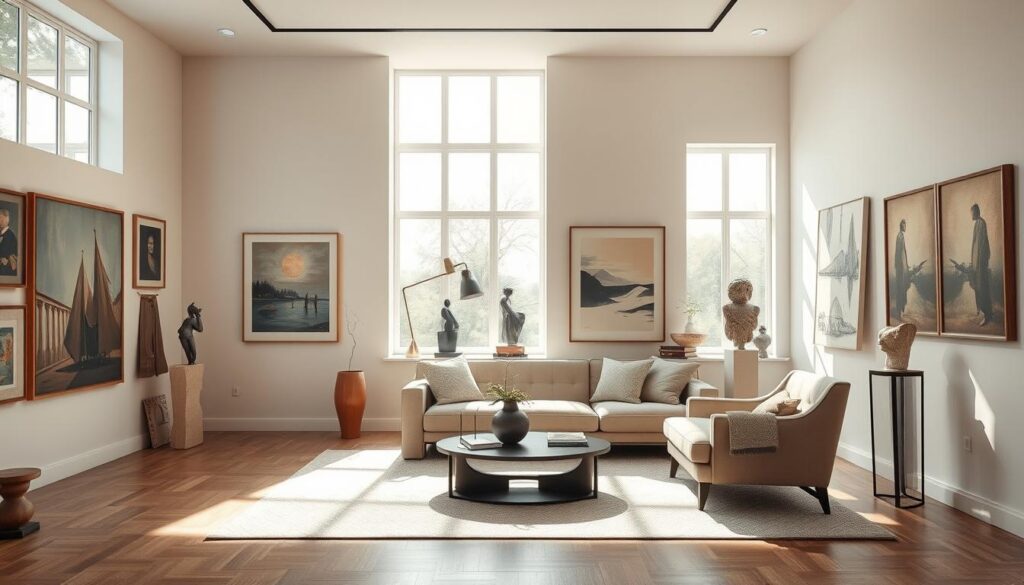
Selecting Pieces That Resonate With Us
Choosing artwork that speaks to us is key. It could be a painting that reminds us of a memory, a sculpture that shows our style, or a print that brings our favorite color into the room.
- Think about the emotions we want the artwork to bring out.
- Consider colors and textures that match our decor.
- Reflect on the artist’s message and the story behind the piece.
Creating a Gallery Wall
A gallery wall is a great way to show off a collection of artwork. It makes a room’s focal point visually appealing. To make a cohesive gallery wall, we should:
- Find a theme or color palette to tie everything together.
- Pick frames that match in style and material.
- Arrange the pieces on the floor before hanging to see the layout.
By carefully choosing and arranging our artwork, we can make a unique and captivating display. It adds character to our home.
7. How to Use Indoor Plants for Style
Indoor plants are a great way to make our homes look better and feel more natural. They help us connect with nature indoors. Plus, they make our homes look stylish and feel better.
Indoor plants are good for the air and make our homes feel more welcoming. They bring a natural beauty that can really improve our mood.
Benefits of Bringing the Outdoors In
Adding indoor plants to our homes can change how we feel and live. Some benefits include:
- Improved air quality thanks to plants’ natural air-purifying abilities
- Enhanced beauty, adding a natural touch to our decor
- Less stress and better mental health
- More humidity, which is great in dry places
Best Indoor Plants for Beginners
If you’re new to indoor gardening, pick plants that are easy to care for. Some good choices are:
| Plant Type | Lighting Requirements | Watering Needs |
|---|---|---|
| Snake Plant | Low to Bright Light | Infrequent Watering |
| ZZ Plant | Low Light | Rare Watering |
| Spider Plant | Bright Indirect Light | Regular Watering |
Choosing the right plants and adding them to our decor can make our homes more welcoming and stylish. It also helps us feel better.
8. Open Floor Plans: The New Standard
Open floor plans are becoming more popular for their spacious and connected feel. They make a room feel bigger and more open. This is great for homeowners who want to improve their living space.
Creating Flow Between Spaces
Open floor plans help spaces flow smoothly together. By removing walls, we get a better connection between areas. This makes the home look better and work better too.
To make spaces flow well, use the same flooring everywhere. A consistent color scheme also helps keep things looking connected.
Pros and Cons of Open Layouts
Open floor plans have their good points and bad points. The good side is they make homes feel bigger and help people interact better.
- Pros:
- Increased sense of space and openness
- Improved interaction and visibility
- Enhanced natural light distribution
- Cons:
- Potential for increased noise levels
- Lack of privacy
- Difficulty in defining separate areas
To deal with the downsides, we can use design tricks. Area rugs, different lights, or furniture setups can help divide spaces without walls.
By weighing the pros and cons and using smart design, we can make a stylish and useful living area.
9. Mixing Vintage and Modern Elements
Mixing vintage and modern styles is about finding a balance. This mix makes a space feel both special and lived-in.
Finding Unique Antique Pieces
To mix styles, start by finding unique antique items. Look at local thrift stores, estate sales, or online. Choose items based on their craftsmanship, material, and history to add value.
Tips for Finding Antique Pieces:
- Check items for condition and authenticity.
- Learn about the item’s history to understand its value.
- Always try to negotiate prices at sales or shops.
Blending Old with New for Character
After finding vintage pieces, blend them with modern items. The goal is to create a balanced look. For example, pair a vintage armchair with a modern sofa for contrast.
Consider the following when blending styles:
| Element | Vintage Style | Modern Style |
|---|---|---|
| Furniture | Ornate carvings, rich wood tones | Clean lines, minimalist design |
| Lighting | Antique chandeliers, brass fixtures | Sleek pendant lights, LED technology |
| Textiles | Velvet, lace, intricate patterns | Simple patterns, cotton, linen |
By carefully combining these elements, we create a space that’s uniquely ours.
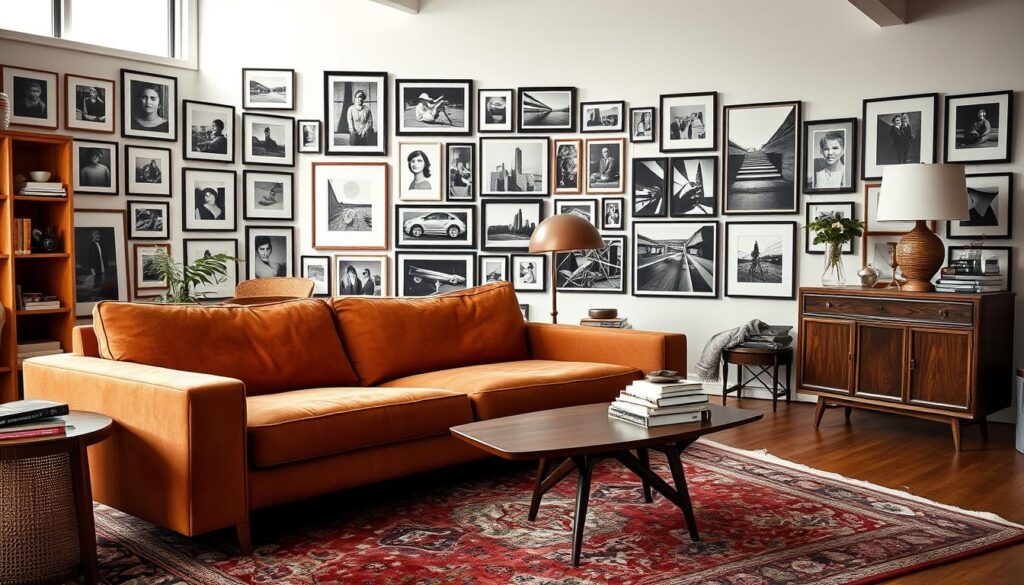
Mixing vintage and modern styles is all about experimenting and enjoying the design process. As we mix styles, we make a space that looks great and tells a story.
10. Personalizing Our Space with DIY Projects
DIY projects let us turn our homes into mirrors of our personalities. This makes our spaces unique and brings us joy.
DIY decor is getting more popular. It lets us show our creativity and make our homes more stylish.
Easy DIY Decor Ideas
Starting with DIY decor is easy. We can reuse old items or make new ones. Here are some simple ideas:
- Creating a gallery wall with personal photos and artwork
- Upcycling old furniture with a fresh coat of paint
- Making decorative throw pillows with custom fabric designs
These projects are fun and let us add a personal touch. By choosing items that match our style, we create a welcoming space.
Customizing Store-Bought Items
Customizing store-bought items is a great way to make our space unique. A few simple changes can turn generic items into something special.
For example, we can make a store-bought vase unique by painting it or using decoupage. This small change can make a big difference in our decor.
| Item | Customization Idea | Result |
|---|---|---|
| Plain Vase | Painting or decoupage | Unique decorative piece |
| Basic Lamp | Replacing the shade with a custom design | Personalized lighting fixture |
| Generic Throw Pillows | Adding custom embroidery or fabric paint | Customized home decor |
By doing DIY projects and customizing items, we can make our homes truly our own. It’s all about trying new things and enjoying the process.
11. Sustainability in Home Design
Sustainability is now a must in home design, changing how we live and interact with our homes. As we grow more aware of the environment, it’s key to use eco-friendly practices and materials in our homes.
Eco-Friendly Materials and Practices
Choosing the right materials is a big step towards a sustainable home. Eco-friendly materials like reclaimed wood, bamboo, and low-VOC paints help the environment and make our homes healthier.
Practices like recycling, upcycling, and reducing waste during building or renovation make our homes more sustainable. As TerraChoice says, “going green” means making smart choices that help our homes and the planet.
“The green building movement is not just about being green; it’s about being smart, it’s about being efficient, and it’s about creating buildings that are healthy for people.”
Energy-Efficient Solutions for Homes
Energy efficiency is key in sustainable home design. Using energy-efficient solutions like LED lights, energy-star appliances, and smart home systems cuts down energy use.
Also, using renewable energy like solar panels reduces our need for fossil fuels, lowering carbon emissions. As we aim for a greener future, focusing on energy efficiency in home design is crucial.
- Use energy-efficient appliances and lighting.
- Invest in smart home technology to monitor and control energy usage.
- Consider renewable energy sources like solar or wind power.
By choosing wisely, we help the environment and make our homes more comfortable, healthy, and affordable over time.
12. Staying Trend-Forward: What’s Hot Right Now
Exploring home design means keeping up with the latest trends. Modern trends focus on both function and style. By using these trends, we can make our space feel new and trendy.
Current Design Elements
Today’s home design trends include bold colors, eco-friendly materials, and versatile furniture. These elements bring depth and character to our homes. They make our spaces feel welcoming and modern.
Investing in Timeless Styles
It’s key to stay current with trends but also invest in timeless styles. Mixing current trends with classic styles creates a lasting look. This way, our home stays stylish and doesn’t need constant updates.

